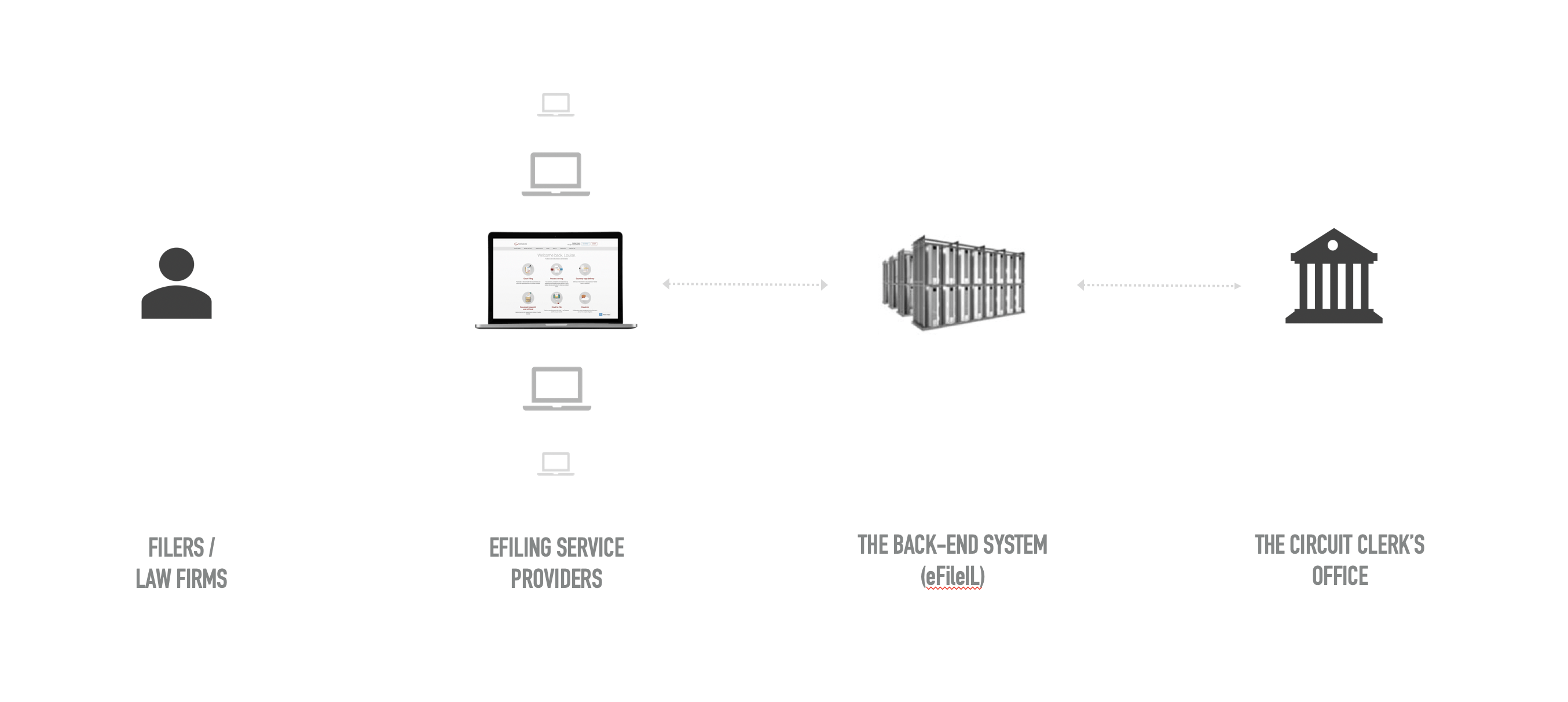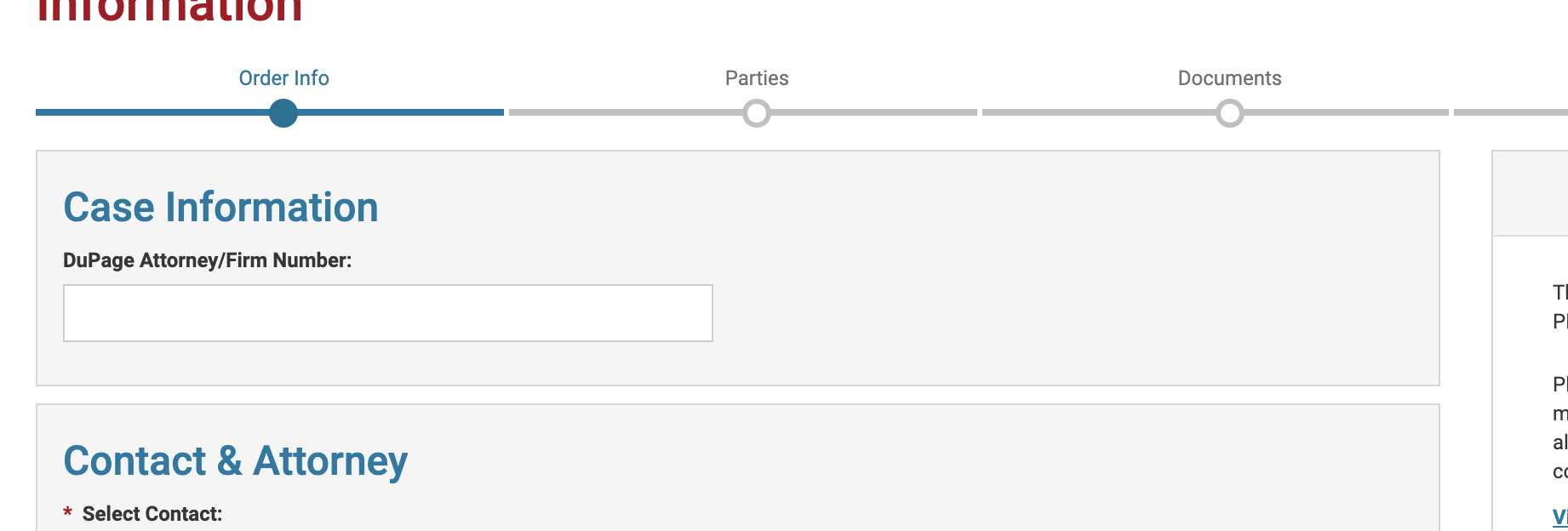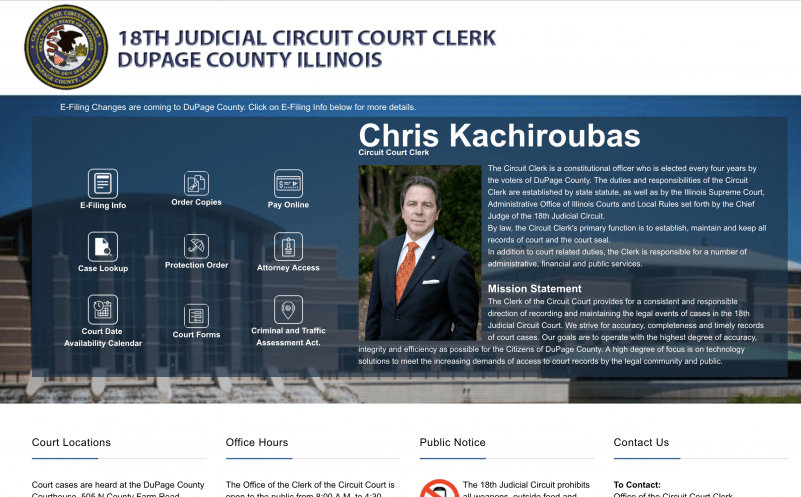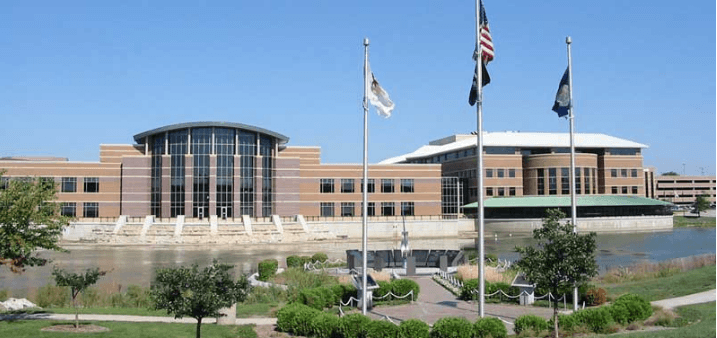Starting July 1, court filers must use an eFileIL-certified eFiling service provider (EFSP) to file civil cases in DuPage County. On that day, Illinois’ electronic court filing system truly becomes statewide; serving all 102 counties, as well as the supreme and appellate courts.
Read: ‘How to choose an electronic filing service provider in your state’ >
It’s been a monumental project nearly 20 years in the making. It means filers can learn just one system of their choice and file anywhere in the state.
The challenges of standardizing Illinois’ eFiling process
For some—particularly in DuPage County—the benefits of this new process also come with a list of concerns.
Lisa Goodwin is the project manager tasked with overseeing the county clerk’s office’s transition to using the statewide eFileIL system to accept court filings. That gives her a unique insight into the growing pains of moving from an eFiling system custom-built for her county to a one-size-fits-all platform for the entire state.

“Our old system and EFSP in DuPage County were very tightly integrated,” Goodwin explained. “There were a lot of points in our eFiling acceptance process where no one in our office even had to touch the electronic filing in order for it to be docketed onto a case.”
Mostly, that’s because DuPage County’s old EFSP, i2File, had been built specifically to incorporate filing processes already in place in the county. That necessarily changed with the eFileIL system, which was developed to create a standard eFiling process throughout all of Illinois—and other states where a similar “open” eFiling system has been implemented by Texas-based software developers Tyler Technologies.
Connecting DuPage County to eFileIL
In states with an open eFiling system, a technology company like Tyler is awarded a contract to build an eFiling platform that sets standard rules for the state’s court filing workflow, and connects to each court’s case management system. Then, other technology companies—called eFiling service providers (EFSPs)—develop the actual websites that users can log into to connect to this platform and submit their filings.

But connecting a court’s case management system to a new system is no small task. “We’ve had to rewrite our entire integration,” Goodwin said.
What to expect when eFiling in DuPage County
So what can DuPage County filers expect when that integration is complete, and they must use a certified eFileIL service provider to continue filing? Here are some predictions.
1. DuPage County will likely avoid many of the eFiling issues seen in Cook County.
Goodwin and her team in the DuPage County Clerk’s office closely monitored last summer’s rollout of eFileIL in neighboring Cook County. Many of the early difficulties, they noticed, centered around scheduling functions—such as requesting a hearing or return date.
For this reason, the DuPage County Clerk’s office decided not to rely on the eFileIL system for scheduling. Instead, these processes can be accomplished on the DuPage County’s Clerk’s website, 18thjudicial.org.
2. There will be fewer locally customized features in the new EFSPs.
The basic framework that certified EFSPs must follow to collect and submit filing information through the eFileIL system is the same throughout Illinois. When changes are needed for a specific county, Tyler Technologies must alter the framework of the system to accommodate them—something that runs counter to the goal of establishing one court filing workflow for all of Illinois.
Thus far, the only custom feature known to be in the works for DuPage County’s workflow is the required use of a DuPage County attorney code.
3. A DuPage County attorney code will be required when making a new filing.

Just as in Cook County, law firms filing in DuPage County will need to enter their five-digit, county-issued attorney code at the beginning of each filing. The opportunity to enter this will appear at the beginning of the filing workflow.
Pro se filers may enter the code “99500” here to fulfill this requirement.
4. DuPage County clerks will no longer be able to put the case management or diligence date in the file stamp when accepting a filing.
However, anyone with an ARDC number can sign up for DuPage County’s Case Restricted Information System (CRIS). Here, filers can see all their case management and diligence dates, as well as other relevant case information.
5. DuPage County will not allow “attachments” to a filing.
The eFileIL system has a framework for accepting documents filed as “attachments” to a filing.
For example, in some counties, you can upload a lead document (i.e. a complaint or a motion) and then attach other documents (i.e. your exhibits) to that document. That won’t be the case in DuPage County.
Read: ‘eFiling exhibits: Best practices for your court’ >
“If you’re going to upload three summonses, you’re going to have to input three individual [documents] and [make] three individual uploads to accommodate that,” Goodwin said.
6. In most cases, exhibits must still have individual cover sheets.
According to Local Rule 5.06 (b), “Any exhibits that are filed separately from their associated pleading, motion, or document due to size limitations (even though filed in the same transaction), shall be filed with the DuPage Exhibit Cover Sheet, Form 4393.”
However, the same rule also says, “Electronically filed exhibits may be filed with their associated pleading, motion, or document in the same PDF as long as size limits allow for it.”
In this case, Goodwin clarified, a cover sheet isn’t necessary. “We won’t be rejecting it if the clerk can verify that it’s being filed on the proper case and it’s relevant to a particular motion.”
7. Any documents requiring return dates or hearing dates must be filed in a subsequent filing.
DuPage County will disallow filing of documents that require hearing dates or return dates (i.e. certain types of summonses and pleadings) on case initiations.
“When we get a new case filing, we randomize which courtroom it gets assigned to,” Goodwin explained. “So if we have five chancery courtrooms, we don’t know which courtroom your case filing is going to be assigned to until we actually get it into our case management system.”
In the example of a complaint filing, filers should file the complaint using their EFSP of choice. Then they should:
- Go to 18thjudicial.org.
- Open the Court Date Availability Calendar, and enter the case number.
- When prompted for the reason for the date, choose “RETURN DATE.”
- Add the chosen date to any documents that require it (i.e. the summons), and upload it in your EFSP on a subsequent filing.
A similar process should be followed for entering notice of motions with hearing dates on subsequent filings. However, when prompted for the reason for the date, filers should choose “MOTION.”

8. Filers will have access to critical case information not stored in their EFSP at 18thjudicial.org.
In addition to the information discussed above, 18thjudicial.org will contain:
- Links to all of DuPage County’s court forms in fillable PDF format.
- A tool that generates a notice of motion electronically, with the ability to docket it on a particular day, time and courtroom. (However, filers will still need to download the completed notice of motion and eServe it using an Illinois certified EFSP.)
- A form for making certified copy requests, and downloading the copies as a digital file. (In One Legal, you can go a step further by ordering “courtesy copies” of any filing to be printed and delivered to a judge.)
9. Filers will not be able to choose service through the DuPage County Sheriff—at least initially.
The eFileIL platform is not connected to any county sheriff’s offices in Illinois. While One Legal has developed its own capability to serve via the Cook County Sheriff, no Illinois EFSPs are currently connected to the DuPage County Sheriff.
According to Goodwin, the Winnebago County clerk’s office sends certain eFiled documents to the sheriff for service on behalf of the filer. She noted a similar arrangement could be developed in DuPage County, but it won’t be ready by July 1.
“That’s something we may be considering in the future,” Goodwin said.
Be prepared for DuPage County’s new eFiling system
The Illinois Paralegal Association and DuPage County Bar Association are teaming up to throw two one-hour, after-work filer education events—one on June 5 in Chicago and another June 25 in Wheaton. Food and drinks will be provided.
Separately, One Legal will be holding free, 1-hour webinars you can attend online.
Register for July 1 webinar: ‘Adapting to DuPage County’s new court filing system’ >
You can also follow news about DuPage County’s new eFiling system by subscribing to One Legal’s Illinois court filing blog, or on 18thjudicial.org.








